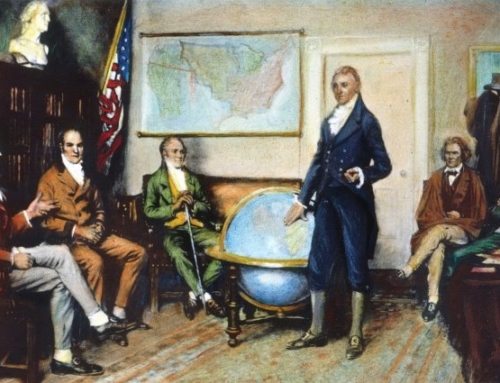Suggestions that Congress use Article I Section VIII to restrict the president’s power to engage in war, nuclear or otherwise, are both unconstitutional and imprudent.
 Last week, 30 Congressional Democrats sent a letter to President Biden asking him to “review the ways in which you can end the sole authority you have to launch a nuclear attack.”[1] One of their suggestions was that the president first seek a declaration of war from Congress before launching a nuclear first strike. Another recommended the creation of a Congressional council that the president would have to consult and seek approval from to launch a nuclear first strike. At stake here are two issues: Where does the president derive his constitutional authority to use nuclear weapons from and would mandating Congressional pre-approval be prudent nuclear weapons policy?
Last week, 30 Congressional Democrats sent a letter to President Biden asking him to “review the ways in which you can end the sole authority you have to launch a nuclear attack.”[1] One of their suggestions was that the president first seek a declaration of war from Congress before launching a nuclear first strike. Another recommended the creation of a Congressional council that the president would have to consult and seek approval from to launch a nuclear first strike. At stake here are two issues: Where does the president derive his constitutional authority to use nuclear weapons from and would mandating Congressional pre-approval be prudent nuclear weapons policy?
First, Congress’ power to “declare war” under Article I Section VIII is often misinterpreted as equivalent to “making war” or “engaging in war.” This distinction is not academic. In writing the Constitution, the Framers understood the word “declare” to mean “to make known or publish”; “to proclaim some resolution or opinion.” The word “engage” was instead understood to mean “to embark in an affair”; “to conflict; to fight.” This is reflected in their choice of wording later in Article I as Section X states that “No State shall, without the consent of Congress,… engage in war unless actually invaded, or in such imminent danger as will not admit of delay.” Here, the difference between the meaning of “declare war” and “engage in war” are made even clearer by Section X’s implication that the threat of invasion may necessitate the use of military force for the purpose of self-defense.
By contrast, Section VIII contains nothing that would change or add to the meaning of “declare.” There are no caveats or qualifications to suggest that Section VIII is an exclusive clause. It offers no binding requirement that a declaration of war precede some sort of military action or initiation of hostilities. Nowhere in the Constitution is any such language found. Indeed, Section X shows that if the Framers had wanted to require Congressional pre-approval, they could have easily written it into the text. Thus, Article I Section VIII can only be interpreted to mean that a declaration of war is equivalent to a proclamation of a state of relations between the United States and another country.
In interpreting the meaning behind the constitutional language in Section VIII and Section X, it is also helpful to consider that it is not unusual for declarations of war to follow the commencement of hostilities. As U.C. Berkeley law professor and constitutional scholar John Yoo explains,
At the time that the Continental Congress met at Philadelphia in 1776 to draft the Declaration, hostilities had existed for more than a year, and Congress had been exercising sovereign powers-negotiating with Britain, sending representatives abroad, seeking aid-for at least two years… The Declaration of Independence’s importance was not in authorizing combat, but in transforming the legal status of the hostilities between Great Britain and her colonies from an insurrection to a war between equals.[2]
This sequence of events shows how declarations of war are instead a tool of international diplomacy rather than an authorization to use military force. In this case, the Declaration of Independence elevated a colonial insurrection to the level of war between nation-states. As such, the independent American colonies could receive foreign ambassadors, make alliances with other powers, and be recognized for exercising sovereignty over its territorial holdings. Throughout the War for Independence, the Continental Congress did all those things to great effect.
The president derives his authority to authorize the use of military force abroad from Article II Section II which confers upon him the role of “Commander in Chief of the Army and Navy of the United States.” Like any military commander, the president may order the armed forces to conduct operations abroad at his discretion. There are practical and prudential reasons for this. As it has been interpreted by nearly every president, the power to engage in war and conduct foreign policy is a function best suited for a unitary executive figure. In the Federalist Papers, Alexander Hamilton noted as much when writing about the need for a “vigorous executive” in matters of foreign policy. “Decision, activity, secrecy, and despatch will generally characterize the proceedings of one man in a much more eminent degree than the proceedings of any greater number; and in proportion as the number is increased, these qualities will be diminished.”
Simply from a functionality standpoint, it makes sense that one unitary figure would have control over the deployment and use of military assets abroad. It is not always clear that every military engagement amounts to war and it would be impractical to expect members of Congress to maintain the level of secrecy and discretion necessary for conduct of foreign policy. Requiring both houses to vote before authorizing any sort of military action would be a dysfunctional way to conduct foreign affairs, especially in times of crisis. If the president cannot (to quote Section X) “engage in war unless actually invaded, or in such imminent danger as will not admit of delay,” then his role as commander-in-chief is essentially meaningless.
So how are the powers of war divided between Congress and the executive branch? Throughout the ratification process, instead of arguing whether congressional declarations of war restricted the executive’s ability to wage it, the Federalists and the Anti-Federalists debated within the paradigm of who controlled the “sword” and the “purse.” This was reflective of their admiration for the British separation of powers framework which contained a powerful check on the executive’s ability to make war. As James Madison explained in a rebuke to Anti-Federalist Patrick Henry, “Apply it to the British Government… The sword is in the hands of the British King. The purse in the hands of the Parliament. It is so in America, as far as any analogy can exist. The purse is in the hands of the Representatives of the people. They have the appropriation of all monies.” Note that Madison does not argue that a declaration of war would restrict the president’s war making ability; Congress’ prerogative to “raise and support armies” would be enough.
Thus, the relationship between Congress and the executive rests on this division of labor. If Congress does not like the way President Biden is exercising his authority as commander-in-chief, then their main check against him is to withhold military appropriations. Likewise, if Mr. Biden judges that a Congressional declaration of war against another state would be imprudent, as commander-in-chief he may order the armed forces to stand down and avoid hostilities.
Since nuclear weapons are a component of America’s national defense strategy and integrated into the armed forces, Mr. Biden has the authority to launch a first strike without Congressional pre-approval. While nuclear weapons are unique strategic assets, constitutionally, there is no reason to regard them as any different than the army, navy, or air force.
The second issue with the restricting the president’s authority and ability to launch a nuclear first strike is that it is not clear that it would make the threat of an ill-advised launch any less prevalent. If, as the Congressional letter to President Biden notes, the president was exhibiting behavior that caused others to question his judgement, then why would he sit down to deliberate with a Congressional council? It is instead more likely, and appropriate, that executive branch officers intervene informally or invoke the 25th amendment if they thought that the president was no longer a rational actor.
Yet, as a matter of decision-making, why would a council be better equipped to consent to a nuclear strike than an executive figure with sole authority? What if members of the council were spread across the country and unable to participate? How would the council agree on the best course of action if another country suddenly put its nuclear forces on high alert or if radar screens indicated that an ICBM had been launched from another country? Given that the time frame to make such a critical decision is less than half an hour, it is easy to see how requiring Congressional consent before launching a nuclear strike could end up being a legalistic suicide pact.[3] As with past executive authorization of military action, presidents are often forced to make quick decisions based on incomplete and unverifiable information. There are simply too many variables involved in undertaking a nuclear strike for a council to consider in such a short period of time.
The distinction between the role of Congress and the president in foreign policy comes down to a matter of functionality. The latter is clearly much better suited to exercise authority in foreign policy which would be paralyzed by multiple voices claiming authority. If the American people do not like the way the executive is handling the nation’s foreign affairs, then they can vote him out of office or allow their elected representatives to counteract his initiatives through constitutional mechanisms. But suggestions that Congress use Article I Section VIII to restrict the president’s power to engage in war, nuclear or otherwise, are both unconstitutional and imprudent.
The Imaginative Conservative applies the principle of appreciation to the discussion of culture and politics—we approach dialogue with magnanimity rather than with mere civility. Will you help us remain a refreshing oasis in the increasingly contentious arena of modern discourse? Please consider donating now.
Notes:
[1] See Emily Jacobs, “House Democrats ask Biden to give up sole power to launch nuclear bomb,” New York Post (February 2021).
[2] John C. Yoo, “War and the Constitutional Text,” The University of Chicago Law Review.
[3] See Dave Merrill, Nafeesa Syeed, and Brittany Harris, “To Launch a Nuclear Strike, President Trump Would Take These Steps,” Bloomberg (January 2017).
The featured image is a combination of an image of Joseph Biden and an image of an atomic bomb explosion from a U.S. Federal Emergency Management Agency publicity poster. Both images are in the public domain and appear here courtesy of Wikimedia Commons.







Biden is threatening first strike authority against China , Iran, and Russia.
Russia has responded that if America has that policy, then They have similar rights.
Before we get in a war with Russia, let us review history.
The Charge of the Light Brigade 1845, the great empire or Great Britain was invading Crimea,
which was being defended by Russia. How did that work out?
Napoleon invaded Russia with 400,000 soldiers, came back with 5,000.
Germany invaded Russia with the largest invading military forces in history, up to that date.
After losing millions of civilians, Russia pushed them back home and beat them into submission.
Russia has effective ant-missile systems. Ours dont work, even after billions spent.
Russia has unstoppable Hypersonic missiles and electronic warfare,
which left the 5th Fleet of the US Navy sitting idle, without any electricity for hours.
Are we on a suicide mission?
Biden could be a candidate for the 25th amendment just for teasing war with Russia.